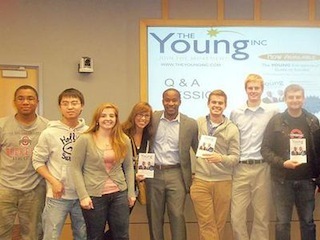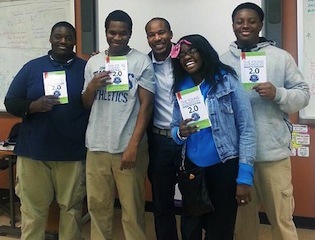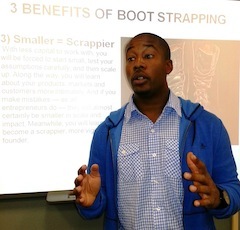****
What makes a good leader? Looking at my own personal growth at SAP, I have found that the Holy Grail of leadership today is engagement. It’s only through truly engaging customers that we’ve increased profitability, and only through employee engagement do we increase productivity. I have been lucky enough to work with an executive coach who truly understands how leaders can inspire teams and foster engagement within both their organizations and their customers’ organizations. This is some of the insight I’ve gained from her on engagement, people management, and leadership.
Build a team of your own personal challengers
A recent article in the Economist claimed that as technology continues to become more intelligent, the role of the leader will center more and more on innovative thought leadership. In order to prepare themselves for this reality, leaders must continually nourish their minds with complex problems, new ideas, and divergent perspectives. To this end, everyone needs their own group of personal challengers; external experts who fulfill that part of their development and growth on an ongoing basis. This could be mentors, coaches, business advisors, or just friends who work in different industries. While it takes some work to assemble and practice, it’s a critical element to developing your breadth of thinking and continuing your growth.
 |
| Image Source: forbes.com |
Convene and intervene
A very helpful leadership philosophy that I have learned is to convene and intervene. On one hand, part of being a leader is cultivating growth which entails convening people under a common purpose and allowing ideas to flourish. On the other hand, it’s about knowing when to jump in and steer the ship which entails helping the team take their ideas and shape them into something meaningful and executable. The leadership philosophy of convene and intervene allows you to be more present in a meeting by taking the onus off getting to the answer and instead focusing on the process of watching ideas grow and then simply shaping them. Not only does this help people feel engaged in the process, it also helps you learn a lot about the people you work with.
Two-to-one
Traditional thinking says that when coaching people, be sure to balance things that are working (positives) with lessons to be learned (negatives). Recent thinking suggests that the magic ratio is not 1:1, but in fact, 2:1. The 2:1 theory is that by emphasizing the positives, you create more buoyancy, leaving people feeling bullish and supported while at the same time having something constructive to work on. It’s so easy to jump right into the issue, especially in a company like ours where urgency can sometimes rule the day. I find myself needing reminders to adhere to this simple 2:1 rule of thumb, but when I do, I am stunned by the results.
Flying high and diving deep
Leadership in a sales driven organization requires an interesting balance of skills: the ability to help refine the details while simultaneously understanding the business with enough breadth to shape the strategy. The balance of knowing when to ‘fly high’ and ensure the overall health of the business, and when to ‘dive deep’ and run right alongside the teams, is a careful balancing act that is imperative to master for the sustainable health of both the business and the team. It can be really unnerving for people when a leader moves from one to the other quickly, which happens when leaders have both skills. Over time, and with amazing support, I have learned that announcing the switch – in a deliberate way – can help people understand what you’re doing. It ensures that people know they’re still trusted even though you need to understand the finite detail, and it allows them to understand that you also see the big picture and are looking out for their long term wellbeing.
Give, give, give, gone
Because there is never enough of it, time is the most valued gift we have to give. I’ve learned that when you have time with someone, give them everything you’ve got – your absolute undivided attention. If you say you’ll do something for them, do it there and then. Make the phone call, find them the document, send the email – but when they leave, move onto the next thing. This means you can always be true to your word, people get from you what they need, and you’re fresh and available to do it again when you move on to your next meeting.
Follow this Marc Accetta Facebook page to learn more about the characteristics of a good leader.





![2014_8_27-large-AM-Twenty_Tweets_On_Leadership[1]](http://blogs-images.forbes.com/jasonnazar/files/2014/08/2014_8_27-large-AM-Twenty_Tweets_On_Leadership1.png)











